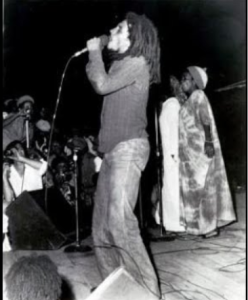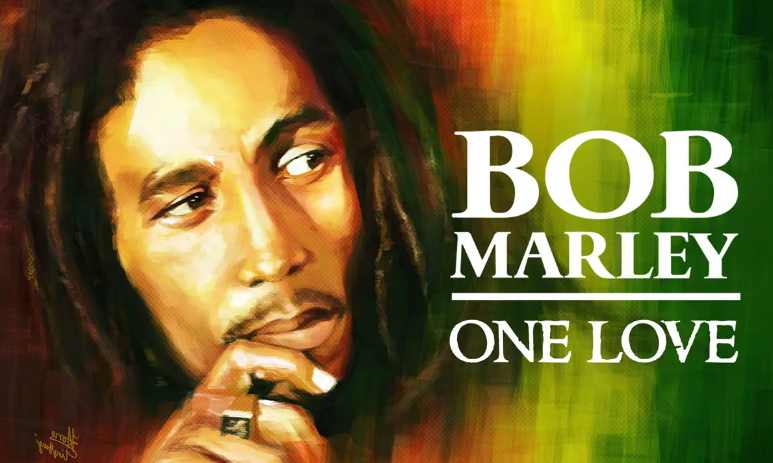On Feb. 14, 2024, “Bob Marley: One Love” was released in theaters in the United States. A movie about the reggae singer’s path to fame and his struggles behind the curtain of stardom, this powerful story highlighted the unifying strength of music. His rise from war-torn Jamaica to international celebrity status is a classic rags-to-riches story, but the underlying message in his movie, just like all of his music, is the expression of how life is too short to hate when love is always an option.
The movie begins by showing us how he planned his first major peace concert, “Smile Jamaica.” The concert was held on Dec. 5, 1976, in Kingston, Jamaica, but was almost canceled by a murder. Amid fighting between the two major political parties in the nation, Marley’s peace concert stood against both of their objectives. Their solution to preventing the well-known Marley from hosting the peace concert was to send two assassins after him to kill him in his home.
The movie blatantly illustrates the brutality of the attempted murder, capturing in slow motion the moment when Marley and his assassin locked eyes. The attack not only almost canceled the concert before it began, but nearly destroyed his future achievements for peace around the world. However, one of his bandmates jumped in front of him and took six bullets while Bob only took two. Bob sustained nonlethal injuries and despite needing to be airlifted to the United States, his friend survived as well. The concert was carried out to an enormous audience, shown in one of the most lively scenes in the movie. The actors had happy faces and Marley looked proud to be able to stand there and sing for Jamaica, while some of Marley’s most recognizable songs played.

Although the band, Bob Marley and the Wailers, was established before “Smile Jamaica,” the concert ballooned their popularity. The movie shows how Marley became known worldwide as an icon of peace. However, while Marley was enjoying the life of a star, his family began to feel that he had lost his sense of self. Outside a big party in London, his wife, who was also in the band, finally talked to him about how she felt that touring was more important to him than anything else.
Marley was at first defensive of himself and argued that his music had a purpose, but then he realized the impact of all the touring on the people close to him. He was too busy now to spend time outside of the rehearsal room with anyone, and whenever he went out to parties it was only to make connections.
This talk was one of the most important scenes in the movie and showed the emotional part of Marley previously hidden from the public. The actors here conveyed the tension of the moment very well, minus one rash act. Marley’s wife slapped him in the face out of anger, and perhaps that’s what happened in real life, but if not it seemed a little excessive to me.
The final straw for Marley was when he realized that his friend, who had once saved his life, was embezzling the band the whole time. Marley attacked him, knocking him to the ground, and felt completely betrayed. This pushed Marley to go back to Jamaica to spend some time away from the band. When he arrived, he found the man who had shot him and his friend waiting inside his house.
Marley and the man locked eyes once again, and Marley saw the pain inside his assassin’s eyes. The man cried, “I am come for forgiveness,” and Marley responded, “I don’t carry no vengeance, Rastafari. The seed is planted in your heart. Only you can redeem yourself,” and clasped his hand.
Rastafari is the religious movement Marley showed support for in many of his songs, and he used it now to connect with the man. This scene is undoubtedly the most important and expressive of Bob Marley’s message, and the movie ends with Marley’s “Redemption Song.” This song has Marley singing about the redeeming qualities of having faith and loving others, with a gentle background of acoustic guitar. The choice to use this song made for a beautiful finish that wrapped up the movie with an emotional feel.


